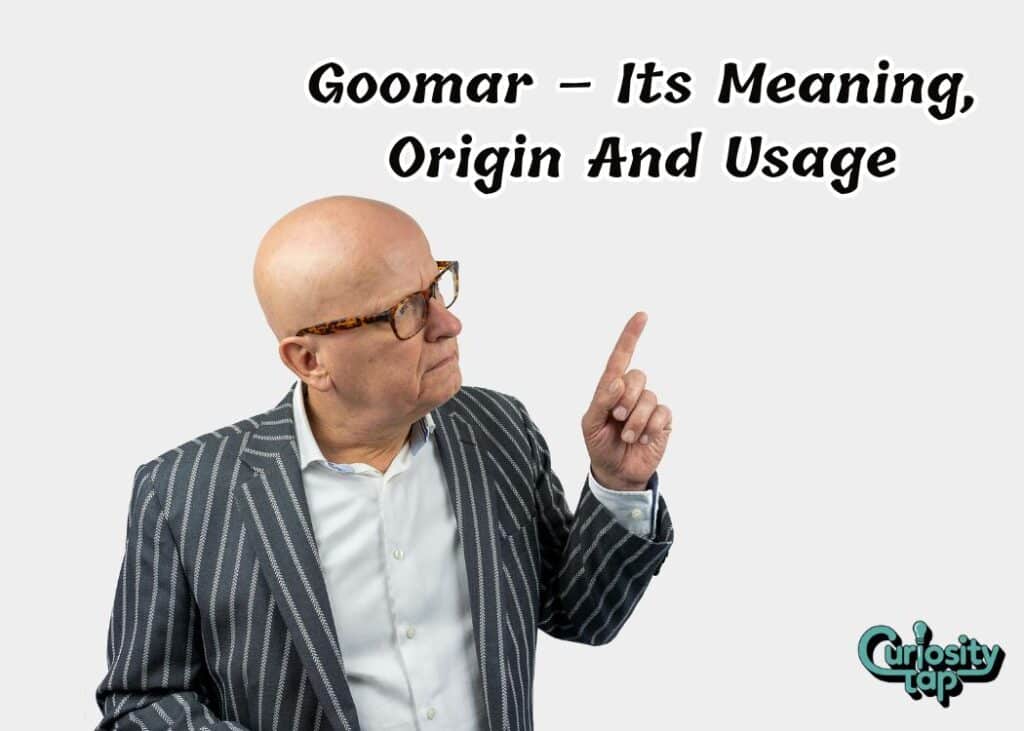Have you ever watched The Sopranos and wondered what Tony Soprano meant when he whispered about his “goomar“? Or perhaps you’ve heard this intriguing term in classic mob movies like Goodfellas and felt curious about its deeper significance?
You’re not alone. This mysterious word carries centuries of cultural weight, hidden meanings, and emotional complexity that extends far beyond simple dictionary definitions.
The term “goomar” represents one of the most fascinating examples of how language evolves, adapts, and carries the secrets of entire communities. It’s a word that speaks to forbidden relationships, hidden loyalties, and the intricate web of Italian-American culture that has captivated audiences worldwide.
Whether you’re a language enthusiast, a fan of mob culture in entertainment, or simply someone who loves understanding the stories behind words, this exploration of goomar will reveal layers of meaning you never expected.
Prepare to discover how a single term can encapsulate power dynamics, secrecy, emotional entanglement, and the complex realities of double lives.
What Does “Goomar” Really Mean?
Goomar is an Italian-American slang term that refers to a mistress or secret lover – specifically, a woman who maintains a hidden romantic relationship with a man who is typically married or committed to someone else.
Unlike casual affairs, a goomar relationship often involves deeper emotional support, companionship, and a more sustained connection.
The term gained widespread recognition through popular mob movies and television shows, where it describes the “other woman” in the lives of mafia figures and organized crime members.
However, its usage extends beyond criminal contexts and can be found in various Italian-American communities.
Key characteristics of a goomar relationship include:
- Secrecy and discretion as fundamental elements
- Emotional intimacy beyond physical attraction
- Often involves financial support or gift-giving
- Maintained alongside a primary relationship (usually marriage)
- Built on loyalty and trust despite the clandestine nature
- Typically long-term rather than a brief affair
The goomar occupies a unique position in relationship dynamics – she’s neither a casual fling nor a potential replacement for a wife, but rather exists in a carefully maintained parallel emotional world.
The Fascinating Origins of “Goomar”
The journey of “goomar” from ancient Latin to modern American slang reveals a captivating linguistic evolution. The word traces its roots back to the Italian term “comare,” which originally meant “godmother” or “close female friend.”
Historical Etymology
The Italian “comare” derives from the Latin word “commater,” which literally means “with mother” (com- meaning “with” and mater meaning “mother”). In traditional Italian culture, a comare was a respected figure – typically a woman who served as a godmother to children or maintained close family ties.
Cultural Evolution in America
When Italian immigrants brought their language to America, certain terms underwent dramatic semantic shifts. The transformation of “comare” into “goomar” represents one of the most intriguing examples of how words can completely change meaning based on cultural context and social dynamics.
In Italian-American communities, particularly those connected to organized crime, the term gradually evolved to describe a woman who occupied a special, intimate position outside of marriage. This linguistic shift reflects the complex power dynamics and gender roles within these communities.
The Linguistic Journey
| Original Term | Language | Meaning | Cultural Context |
| Commater | Latin | “With mother” | Ancient Roman society |
| Commater | Italian | Godmother/Close female friend | Traditional Italian communities |
| Goomar | Italian-American | Secret lover/Mistress | American mob culture |
How “Goomar” Became a Pop Culture Phenomenon
The term “goomar” exploded into mainstream consciousness through iconic mob movies and television series that brought Italian-American culture to global audiences. These portrayals, while often dramatized, helped cement the word’s place in popular culture.
Iconic Media Representations
The Sopranos stands as perhaps the most influential portrayal of goomar relationships. Tony Soprano’s various secret relationships showcased the emotional complexity and power dynamics involved in these arrangements. The show depicted how goomars navigated loyalty, secrecy, and emotional entanglement within the mob lifestyle.
Goodfellas provided another memorable example through Henry Hill’s relationship with Janice Rossi, demonstrating how goomars fit into the broader organized crime lifestyle. The film highlighted the gift-giving, emotional support, and hidden romance that characterize these relationships.
Cultural Impact Beyond Entertainment
These media portrayals introduced millions of viewers to a term that previously existed primarily within Italian-American communities. The word became shorthand for understanding secret relationships, infidelity, and the complex emotional landscapes of double lives.
Popular culture helped establish goomar as more than just slang – it became a cultural anchor that represents specific relationship dynamics and social arrangements.
Real-World Examples of “Goomar” in Context
Understanding “goomar” requires examining how it’s used in various contexts, from casual conversation to literary references. Here are practical examples that illustrate the term’s versatility:
Conversational Usage
- “Marcus has been seeing his goomar every Thursday for the past two years.”
- “She knows she’s his goomar, but the emotional connection keeps her invested.”
- “The restaurant owner’s goomar always gets the best table by the window.”
- “After his divorce, Tony’s goomar became his primary relationship.”
Literary and Media References
- “The don’s goomar wielded more influence than his wife ever realized.”
- “In the novel, the protagonist’s goomar serves as both lover and confidante.”
- “The documentary explored how goomars navigated secrecy in mob families.”
Regional Variations
Different Italian-American communities may use slight variations or emphasize different aspects of the goomar relationship. Some regions focus more on the emotional support aspect, while others emphasize the secrecy and loyalty components.

Creative Alternatives to “Goomar”
While “goomar” carries specific cultural weight, English offers numerous alternatives that capture similar relationship dynamics. Understanding these synonyms helps appreciate the term’s unique position in American slang.
Direct Equivalents
- Mistress – The most formal equivalent
- Side piece – Modern, casual terminology
- The other woman – Emphasizes the secondary position
- Secret lover – Highlights the clandestine nature
- Backdoor lover – Suggests hidden access
Euphemistic Expressions
- Sweet escape – Romantic connotation
- Hidden gem – Suggests special value
- Shadow queen – Implies power despite secrecy
- Forbidden fruit – Biblical reference to temptation
- Silent passion – Emphasizes emotional connection
Cultural Variations
Different cultures have developed their own terms for similar relationships:
- Bit on the side (British English)
- Querida (Spanish – “beloved”)
- Maîtresse (French – “mistress”)
- Geliebte (German – “beloved”)
The Psychology Behind Goomar Relationships
Goomar relationships reveal fascinating insights into human psychology, emotional needs, and the complex ways people navigate loyalty, secrecy, and companionship. These arrangements often fulfill specific psychological functions that traditional relationships might not address.
Emotional Dynamics
The goomar relationship typically provides:
- Emotional escape from daily responsibilities
- Excitement and novelty absent from routine relationships
- Validation and attention in a judgment-free environment
- Companionship without the pressures of primary relationships
- Adventure and risk that some personalities crave
Power and Control
Goomar relationships often involve complex power dynamics where both parties maintain different types of control. The man might provide financial support and gifts, while the woman controls emotional access and availability.
Secrecy as Bonding
The secretive nature of goomar relationships creates unique bonding experiences. Shared secrets, hidden meetings, and clandestine communication can intensify emotional connections and create a sense of special intimacy.
Modern Usage and Cultural Evolution
Today’s understanding of “goomar” extends beyond its mob culture origins. The term has evolved to describe various types of secret relationships and emotional arrangements in contemporary society.
Contemporary Applications
Modern usage of goomar includes:
- Emotional affairs that remain non-physical
- Long-distance relationships maintained alongside local partnerships
- Workplace relationships that must remain hidden
- Social media connections that provide emotional support
- Mentor relationships that blur professional and personal boundaries
Digital Age Implications
Technology has transformed how goomar relationships develop and maintain themselves:
- Social media platforms enable secret communication
- Dating apps facilitate discreet connections
- Encrypted messaging protects privacy
- Digital gifts and online support replace traditional expressions
Bonus Tip: The Art of Language Sensitivity
Here’s an insider secret that language experts understand: “goomar“ carries significant emotional weight for many people. When discussing the term, especially in Italian-American communities, approach it with cultural sensitivity and awareness.
The word represents real relationships, complex emotions, and family dynamics that can be deeply personal.
Whether you’re writing about it, discussing it in conversation, or encountering it in media, remember that behind every goomar reference are real human experiences of love, loyalty, secrecy, and emotional complexity.
Expert Advice: What to Do and What to Avoid
What You Should Do:
- Understand the cultural context before using the term
- Recognize the emotional complexity involved in these relationships
- Respect the privacy of real-world situations
- Appreciate the linguistic evolution that created the term
- Use the word appropriately in relevant contexts
What You Should Avoid:
- Romanticizing or glamorizing secretive relationships
- Judging people involved in complex emotional situations
- Using the term casually without understanding its weight
- Stereotyping Italian-American culture based on media portrayals
- Assuming all goomars fit the same pattern
Remember that “goomar” represents real human experiences, not just entertainment tropes. Approach the term with the same respect you’d show any aspect of someone’s personal relationships.
Frequently Asked Questions
What’s the difference between a goomar and a regular mistress?
A goomar typically involves deeper emotional connection and cultural context than a regular mistress. While both terms describe secret relationships, goomar implies Italian-American cultural background and often includes emotional support and companionship beyond physical attraction. The relationship tends to be more sustained and emotionally complex.
Is “goomar” considered offensive or derogatory?
“Goomar” is generally not considered offensive within Italian-American communities where it originated, but context matters significantly. The term describes a specific type of relationship without inherent judgment. However, using it to stereotype or mock Italian-American culture would be inappropriate. Cultural sensitivity is key when discussing the term.
How do you pronounce “goomar” correctly?
“Goomar” is pronounced “goo-MAR” with emphasis on the second syllable. The first syllable sounds like “goo” (as in “good”), and the second syllable rhymes with “car” or “far.” The pronunciation reflects its Italian-American origins and differs slightly from the original Italian “comare”.
Are goomar relationships still common in modern times?
While the traditional mob-connected goomar relationships are less common today, similar secretive romantic arrangements continue in various forms. Modern goomar-like relationships might involve emotional affairs, long-distance connections, or digital relationships that fulfill similar emotional needs for companionship and intimacy outside primary relationships.
Conclusion
The word “goomar” stands as a testament to how language captures the most complex corners of human experience – transforming from a respectful term for godmother into a window into forbidden romance and emotional complexity.
More than just Italian-American slang, it represents universal truths about secrecy, loyalty, and the intricate ways people navigate love in all its complicated forms.
Whether you encounter it in The Sopranos, hear it whispered in conversation, or discover it in literature, goomar reminds us that behind every word lies a story of real people making real choices about connection, desire, and the delicate balance between public lives and private hearts.
In understanding this single term, we glimpse the beautiful messiness of human relationships and the endless capacity of language to evolve, adapt, and preserve the secrets we dare not speak aloud.
Read more knowledgeable blogs on Curiosity Tap
Is this article helpful?

Jackson Pearson is a passionate educator and language enthusiast behind the blog Jackson Pearson. With years of experience in teaching and writing, he specializes in simplifying complex grammar rules, breaking down tricky vocabulary, and crafting learning guides that are both engaging and practical. His mission is to help readers boost their English skills whether they’re beginners or brushing up for fluency. Through every article, Jackson brings clarity, structure, and a spark of curiosity to the world of English learning.



